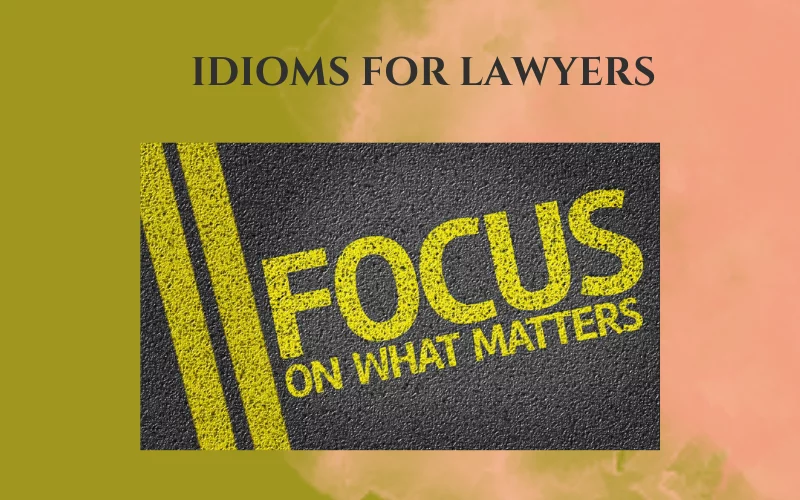Idioms For Lawyers: English Idioms for Legal Professionals

Most lawyers hate idioms. Why? Because they are mysterious and often have no logical meaning. That’s why I’ve created the ebook Idioms for lawyers. Specially selected idioms for lawyers in one convenient place complete with a quick comprehension exercise.
It’s no secret, if you want to impress you need to learn idioms for lawyers. Like it or lump it, being fluent and sounding professional requires you to to demonstrate your command of the lingo and that means using idioms when speaking English in a business setting.
To get you started we’re going to look at a few choice idioms for lawyers in this post. So let’s start with two questions that use idioms.
Have you got your act together? Are practising what you preach?
If not you may need to work on your execution skills by setting better goals and holding yourself accountable when you don’t stay on track.
Lawyers are moving away from the traditional approach to lawyering and are required to be more entrepreneurial. In other words, you have to wear many hats these days.
Like it or lump it, change will come whether you like it or not, so you might as well prepare for it. Get yourself a coach if you need help breaking free from your comfort zone.
Ok, so I used four idioms:
Like it or lump it, an idiom which is a more informal. This idiomatic expression is often used in a negative way.
Got your act together, past tense of get your act together. This idiom is often used in intense/angry situations. People often replace it with, “Get your shit together”.
To practice what you preach . Want to remember this idiom? Think of the Pope preaching to the crowds to be good but not following his own advice.
Stay on track – To remember this idiom try to think of a train and how it can only move forward if it stays on the train tracks.
Explanations of four idioms for lawyers:
“Get your act together”:
This idiomatic expression means to organise oneself, start behaving more responsibly, or improve one’s performance. It is often used when someone needs to make improvements or changes in their behavior or actions. The phrase suggests that the person needs to get their life or actions in order.
Example:
John: “I keep forgetting important deadlines and making mistakes at work.”
Sarah: “Well, it’s time to get your act together and start planning better to avoid these errors.”
“Practice what you preach”:
This phrase means that someone should follow or live by the same principles, advice, or beliefs that they themselves advocate or promote to others. It suggests that a person should lead by example and not just give advice without following it themselves.
Example:
Lisa: “You should exercise regularly and take care of your health.”
Tom: “Easy for you to say, but do you practice what you preach? Do you exercise regularly yourself?”
3. “Like it or lump it”:
Meaning: This phrase is used to convey the idea that you have to accept something whether you like it or not. It expresses the notion that there are no other choices or alternatives.
Example sentence: “The judge has made his decision. We may not agree with it, but we have to like it or lump it.”
4. “Stay on track”:
Meaning: This idiom means to remain focused and not deviate from the current task or goal. It suggests maintaining discipline and following the planned course of action.
Example sentence: “To win the case, it is essential for the lawyer to stay on track and not get distracted by irrelevant details.”
5. “To wear many hats”:
Meaning: This expression is used to describe someone who performs various roles or possesses multiple responsibilities and skills. It implies the ability to switch between different roles or tasks as required.
Example sentence: “As a lawyer, you’ll need to wear many hats, including being a researcher, negotiator, and counsellor.”
Idioms for lawyers in a Dialogue
Lawyer: Good afternoon. How can I assist you today?
Client: Hi, I have a legal document that I need some help with. It’s an employment contract.
Lawyer: Of course, I’d be happy to assist you. Could you provide me with some more details?
Client: Certainly. Firstly, I noticed a clause that says I have to work on weekends as well. Like it or lump it, I guess?
Lawyer: Well, “like it or lump it” is right. The clause means that you have to accept it or refuse it. In this case, if you sign the contract, it means you have to work on weekends.
Client: Alright. I’m also planning to start a side business while working for this company. Can you provide some guidance?
Lawyer: Certainly. As a small business owner, it means you would have multiple roles and responsibilities. So, you would be wearing many hats. We’ll need to review the employment contract to see if any restrictions apply and of course you will have to register details with the tax office.
Client: Alright, that makes sense. Thank you for your help!
Lawyer: You’re welcome. If you have any more questions, feel free to ask.
Idioms for Lawyers: Quick Comprehension
Now, answer the following questions:
1: What does “Get your act together” mean?
A) Relax and take a break
B) Start behaving more responsibly or improve one’s performance
C) Give up on a task
2: How would you use the phrase “Get your act together” in a sentence?
A) “It’s time to get your act together and take a break.”
B) “You should get your act together and start planning better to avoid mistakes.”
C) “I’m tired of trying to get my act together, so I give up.”
3: What does “Practice what you preach” mean?
A) Following someone’s advice without questioning it
B) Living by the same principles, advice, or beliefs that one advocates
C) Giving advice to others without practicing it themselves
4: What does like it or lump it mean in this sentence? “Like it or lump it, this is how things are going to be.”
a) Accept it or refuse it
b) Enjoy it or tolerate it
c) Like it or hate it
5: What does this sentence mean? “He always stays on track during meetings.”
a) He keeps his thoughts organised and focused.
b) He avoids joining meetings entirely.
c) He prefers to discuss off-topic matters.
6: What is the meaning of this sentence? “As a small business owner, she wears many hats.”
a) She has a large collection of hats.
b) She takes on multiple roles and responsibilities.
c) She loves to wear different fashionable hats.
Idioms are expressions that have a figurative meaning that differs from their literal interpretation. They can be challenging for non-native English speakers to understand, as the meaning cannot be deduced by simply looking at the individual words. The best way to include them in your vocabulary is to choose one that you like and make an effort to include it in your vocabulary until you become familiar with it and hen move on to the next one.
Want more idioms?
For the price of a cappuccino you can get access to 67 hand-picked business idioms to use at work.
Generated with Pin Generator
75 Phrases For Meetings
Never be stuck for words
- Build a system
- Speak confidently
- use the right words
Why English Coaching?
English Coaching is the fastest and easiest way to improve your English Skills. Individual programmes specific to your needs. Get results. Work with Caryn
Click to book a chat



